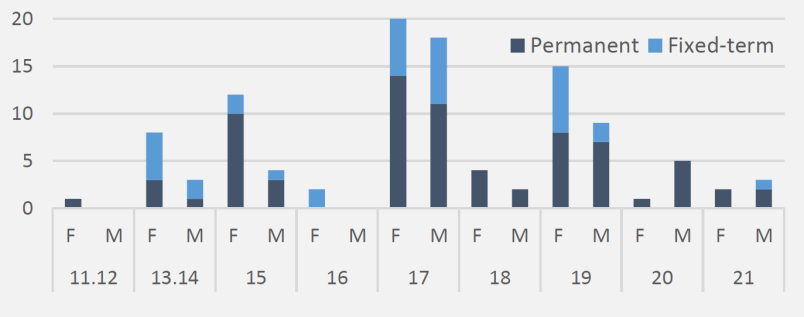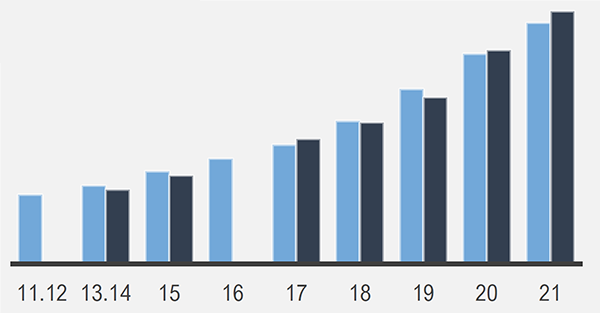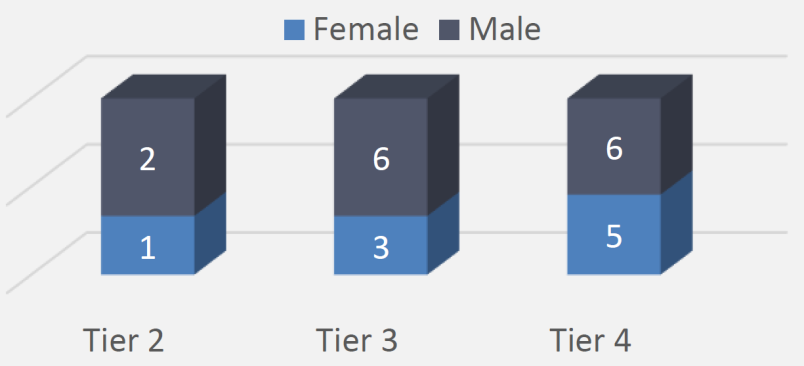Integrating diversity and inclusion is a key ingredient for our organisational success - it helps DPMC and NEMA improve our services to the Government and people of New Zealand, and to attract and retain talented employees. Attached is the NEMA Gender Pay Agency Action Plan for 2021/22.
Formats
NEMA Data Summary as at 21 July 2021#
DPMC Demographics#
Structure of DPMC by grade:

By employee type
| Employee Type |
MEAN Total REM | ||
|---|---|---|---|
| Male | Female | % Gap | |
| Permanent | $130,795 | $109,855 | 16.0 |
| Fixed Term | $137,775 | $115,097 | 16.5 |
| Total | $133,072 | $111,468 | 16.2 |
Men in fixed- term roles are on average in higher grades and paid more than women
By same/similar roles – permanents only and only where sufficient roles to compare
| Grade | Role cluster | # female | # male | GPG Mean |
|---|---|---|---|---|
| 17 | Senior analyst/advisor | 18 | 13 | 2.4% |
By Pay Band – permanents only

Of the 9 pay bands below T2 roles, 4 have a GPG positive to women and 3 have up to 5% GPG.
Gender

Women occupied 39% of all people manager roles (9 of 23) and 33% of T2 and T3
Onboarding and turnover (1 July 2020 to 31 June 2021)#
Onboarding - The GPG for new starters in 2020-2021 was 18%, slightly higher than the overall NEMA Mean GPG of 16.2%. Average starting total remuneration figure (as FTE) was $130,719.96 for men compared to
$106,639.63 for women. From the 62 new hires:
- 30 were permanent positions (16F / 14M)
- 32 were fixed-term positions (16F / 13M / 3 Other)
- a total of 32 (52%) females.
This analysis excludes the 6 secondees-in (all males) onboarded in the same

Approximately 68% off all new hires (42 out of 62) were for positions at grade 17 and below. From those, 57% were women. As the Mean GPG is based on averages and therefore are more influenced by workers who have very low or very high pay, the fact that the majority of women hired are grade 17 or below and the majority of men are grade 17 or above influences the GPG %.
| Female | Male | Total | |||||
|---|---|---|---|---|---|---|---|
| Type | Count | Avr TR | Count | Avr TR | Count | Average TR | GPG |
| Fixed Term | 16 | $112,629.87 | 13 | $121,867.94 | 29 | $117,248.91 | 8% |
| Permanent | 16 | $100,649.38 | 14 | $126,126.64 | 30 | $113,388.01 | 20% |
| Total | 32 | $106,639.63 | 27 | $130,719.96 | 59 | $115,318.46 | 18% |
Offboarding - 21 staff left NEMA in 2020/2021:
- 8 Permanent employees (3F / 5M)
- 13 Fixed-term employees (7F / 5 M)
Considering permanent employees only:
3 were women:
- 66% in grade 17
- 66% from 3 – 10 years and 33% 10+
- Overall average PIR 93%
5 were men:
- 60% were in grade 19
- 60% working for NEMA 10+
- Overall average PIR 92%
Ethnicity – NEMA continues with the focus to improve our ethnicity profile. The new starters in 20-21 fiscal year identified themselves with at least one of the following ethnicities (as staff can choose up to three):
- 57.1% NZ European
- 6.3% Maori
- 11.1% Other European
- 6.3% Asian
- 6.3% Pasifika
- 1.6% African
- 1.6% Chilean
- 4.8% other ethnicity
- 4.8% Not Stated
Staff engagement#
There is no statistical difference in our engagement score (Kōrero Mai) - 62% for women compared to 64% for men. This survey was done in conjunction with DPMC and the results are based on both agencies responses.
What does our data tell us?#
- NEMA’s gender pay gap is primarily driven by occupational segregation. The emergency management field has specialised roles dominated by males, which creates a gender imbalance in NEMA’s hiring pool and workforce.
- Women are over-represented in lower paid bands and roles in the organisation, and under-represented in higher paid bands and roles (particularly those at senior management level where women make up 33%).
- NEMA does not have difficulty attracting or retaining women – 59% of our workforce is female – and 45% of our team leader cohort is female. The challenge is most of our women are in support roles as opposed to leadership.
- NEMA currently has low representation of Māori relative to the communities that we serve (6% versus 16% of the NZ population). We also have low representation of Asian people (6% relative to 15% in the population).
- NEMA is a small agency where changes in staffing can cause data volatility within grades and across the organisation.
Our focus for 2021 and 2022:#
- Identify and promote the development offerings available to support women to progress within NEMA and the broader emergency services sector.
- Implement a targeted approach to identifying and developing aspiring female leaders in order to build the capability in our pipelines that will, in the long term, support the promotion of women into senior leadership.
- Identify and support a broad range of career pathways into and within NEMA.
- Leverage our change programme to attract and recruit a diverse workforce – particularly in terms of Māori.
- Implement new transparent processes for staff development to ensure an inclusive approach.
- Continue to use internships and graduate programmes to bring in more ethnic diversity.
- Continue growing NEMA’s inclusive culture.
- Embed flexible work by default
- Roll-out face to face unconscious bias training for all hiring managers before end of June 2022.
- Undertake quarterly reporting on this and NEMA’s D&I plan.
Action taken in 2020/21 against our plan#
Our GPG plan is focused on what is required for NEMA to close the gender pay gap, it also aligns with the broader requirements for all agencies set out by Te Kawa Mataaho, Public Service Commission .
NEMA Specific#
Gender Balanced Leadership
- DPMC and NEMA set an agreed target of 40/40/20 for leadership roles. When recruiting roles at Tier 3 in NEMA an active effort was made to find strong female applicants, resulting in 33% of NEMA’s senior leadership roles being filled by women.
Equal Pay
- NEMA again met the milestone for Equal Pay. An individual analysis across same or similar roles was completed for permanent staff, with NEMA comfortable that differences (the greatest within a grade is 2.7%) were explainable, by length of service, performance. This analysis was undertaken by HR, people leaders and SLT as part of the remuneration review. When fixed term staff are included the difference is slightly less.
- Supporting the pay equity claim process for business support and clerical roles, being managed by Te Kawa Mataaho.
Flexible work by default
- Progressed implementation including hiring some fully remote workers in response to COVID-19.
- Supported staff to work from home during COVID-19 lockdowns including equipment upgrades.
- NEMA-specific principles and considerations for FBD arrangements document developed and endorsed.
- Included flexible working by default in NEMA recruitment.
Diversity and Inclusion
- Established a NEMA Diversity and Inclusion plan with regular reporting provided to our senior leadership team.
Attraction and recruitment: NEMA specific
- Established an attraction and recruitment working group within the organisation to identify and implement improvements to how we attract and recruit people.
- Initiated a project to review and improve NEMA’s recruitment practices, and hired a full time resource to support managers with recruitment processes. This project included the design of new interview templates.
- Implemented a range of new sourcing channels, including advertising through job boards targeting Māori and working closely with the Ministry for Ethnic Communities when jobs are advertised.
Across DPMC and NEMA#
There is no bias or discrimination in remuneration system and HR practices
- In both 2020 and 2021 remuneration reviews tihe approach taken reviewed every role individually across same and similar roles, with adjustments made to identified anomalies.
- Managers are required to consider gender pay when making an appointment or reviewing remuneration.
- All polices in DPMC and NEMA are under review to remove bias and discrimination where it is identified and to make the language more inclusive if needed. Transparency is being accentuated across all policies.
- The Leave Policy and Guide (including Parental Leave and Breastfeeding Guide are completed.
- The Recruitment Policy and Guide and the Career Progression and Promotion component of the Development Policy have been consulted with staff.
Other
- Permanent and fixed term staff data can now be analysed separately, enabling NEMA to plan strategies for future NEMA based on this information.
Ethnicity
- NEMA has taken on Ethnic Communities Graduates and Tupu Tai Interns.
- The attraction/recruitment approach with targeted advertising using new channels has started to make our staff profile more representative of the communities that we serve, with more ethnic diversity in NEMA.
